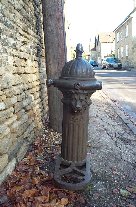


©2015 Deborah Richardson





Privacy Policy
Copyright




Turvey Titbits
Strange, Interesting and Odd Things About Turvey & Its People
Unusual Names for Turvey Children
The 1851 and 1881 Censuses have the following interesting Christian names for village children. Many of these names were quite common in Britain at the time but would now be unusual. Some are from mother's maiden names and some are Biblical -
For girls there was:
Temperance, Selina, Hepzibah, Easter, Kezia (a popular local name of the time), Cilena, Kerenhappuch, Alethea, Duty, Eli, Lettice, Letitia, Rosaly, Blanche, Salome, Johannah, Antheninah (how pretty!), Lydia, Priscilla, Ahinoam (how do you say this?) and Adela
And if you thought the boys might be more conventional, try these:
Algernon, Ephraim, Carington, Gilloway (surely this must be his mum's maiden name!), Ezra, Ebenezer, Jethro, Joel, Steff, Negus, Reuben, Oscar, Herbert, Eben, Legh, Gustavus, Seth, Dudley, St John (Sinjun), and Augustus
If you are thinking that some of the above names are not at all unusual (perhaps you are called Oscar or Lydia) please bear in mind that in Victorian England the majority of people bore one of just a handful of names. The above names are all unusual in that context. There were a few Jews in Bedfordshire at the time which might account for the Old Testament names and remember that upper class families liked to give their children more singular names.
The most popular names for new Turvey babies in the early part of the 17th Century were:
Girls -
Boys -

I have only ever seen these great lion-
Talking the Turvey Talk ...
Turvey is a country village and for many years people spoke in a local dialect.
This has been eroded with the coming of radio and television. Here are some snippets:
'I can't spit sixpence' means 'I'm thirsty'
'Traipsing mud over the house' means 'coming in with dirty shoes'
'My young old boy' means 'my father's son'
'The backhouse table' means 'the kitchen worktop', my nan often said this!
'Traipsing' means wandering around, as in 'Who is that, traipsing about the yard?'
‘Me duck’ means ‘My dear’, the general Turvey term of endearment, for some reason
'Sloome' means 'of neglected appearance'
'Chelping' means 'talks to much'
'Cackling' also means 'talks to much' (were Turveyites very talkative???)
'He's as slow as a wet week' means 'dead slow'
'Homicking' a butch looking woman
'He will not get done till bull's noon' also means someone who is slow
'Gawping' means 'staring' as in 'Stop ya gawping gal!'
'Flacketing' means fidgeting, as in 'Stop flacketing about!'
'Sloomy' the worse the wear for drink
Turvey and The Grand National
From 1953 until 1965 the mill at Turvey was owned by Cristo Crisps (potato chips). One of the flavours of crisps they produced was Oxo.
In 1959 a horse called Oxo was in the Grand National steeplechase at Aintree, ridden by the great Michael Scudamore. Just before the race began the odds were 8-
Just about everyone in the village backed the creatures and there must have been a lot of drinking to his health when he won the race!!
You can relive the excitement of the race by watching the video here.
Big Fish - Big Bird!
Thomas Benbow, the gamekeeper at Turvey Abbey, was certainly well skilled in the ways of the countryside.
On 10th May 1796 he caught a pike, in a bow net, which weighed 21 pounds -
In 1830 he also caught (and killed) a giant swan, weighing 19 pounds and measuring 5ft 3in from beak to claw and with a wingspan of 7ft 6in !!!
The Bells, The Bells
When bells of Olney Church are distinctly heard at Turvey Abbey, it will rain very shortly!
Or so an old Turvey saying goes!
Stone Cold Dead
The winter of 1794/5 must have been a very bad one. Charles Shelton, a mason who was buried on 27 January 1795, was ‘found frozen to Death in Cox’s Close’, according to the Parish Burial Registers. Poor old chap.
Turvey Means...
An old book of place names and their meanings gives the meaning of TURVEY as...
'land of good turf at the bend of the river'

Did You Know....
Turvey was sometimes spelt as “Thorney” in Medieval times.





